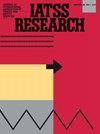Investigating the driving skills-attitudes nexus for safer roads
IF 3.3
Q3 TRANSPORTATION
引用次数: 0
Abstract
While current research extensively delves into the importance of driving skills and attitudes concerning traffic safety, a conspicuous gap remains in substantiating a meaningful correlation between self-reported driving skills and attitudes toward traffic safety. This underscores the need for more in-depth investigation and empirical evidence to better elucidate the nature of the relationship between self-perceived driving skills and attitudes in the context of traffic safety. This study investigates the relationship between drivers' skills and their attitudes toward traffic safety. Data from 664 drivers were collected through self-report questionnaires covering driving skills, attitudes, and demographic information. Factor analysis revealed three distinct factors for both driving skills (perceptual-motor skills, safety skills, and decisional skills) and driving attitudes (attitudes toward rule violations and speeding, attitudes toward careless driving of others, and attitudes toward drinking and driving). Structural equation models unveiled a significant connection between drivers' attitudes and safety skills, as well as decisional skills. Improved safety skills correlated with less favorable attitudes toward rule violations, speeding, careless driving of others, and drinking and driving. Similarly, enhanced decisional skills were associated with a rise in attitudes toward rule violations, speeding, and disregarding careless driving of others. Demographic analysis indicated an inverse correlation between age and attitude factors/decisional skills, coupled with a positive correlation with safety skills. Older individuals had less favorable attitudes toward rule violation, speeding, careless driving of others, the combination of drinking and driving, and their decisional skills were lower. Gender analysis revealed that men had a lower favorable viewpoint toward all three attitude dimensions and reported higher perceptual-motor and decisional skills compared to safety skills. The findings underscore the significance of safety and decisional skills in shaping attitudes toward traffic safety. Demographic factors, particularly age and gender, play a role in influencing these skills and attitudes, offering valuable insights for interventions and policy considerations.
调查驾驶技能与态度之间的关系,促进道路安全
尽管目前的研究广泛深入地探讨了驾驶技能和交通安全态度的重要性,但在证实自我感觉的驾驶技能与交通安全态度之间有意义的相关性方面仍存在明显差距。因此,有必要进行更深入的调查和实证研究,以更好地阐明自我感觉的驾驶技能与交通安全态度之间关系的本质。本研究调查了驾驶员的驾驶技能与他们对交通安全的态度之间的关系。通过自我报告问卷收集了 664 名驾驶员的数据,内容包括驾驶技能、态度和人口统计信息。因子分析显示,驾驶技能(感知-运动技能、安全技能和决策技能)和驾驶态度(对违章和超速的态度、对他人不小心驾驶的态度和对酒后驾驶的态度)都有三个不同的因子。结构方程模型揭示了驾驶者的态度与安全技能和决策技能之间的重要联系。安全技能的提高与对违规、超速、不小心驾驶他人和酒后驾驶的态度相关。同样,决策技能的提高也与对违反规则、超速和不顾他人安全驾驶的态度上升有关。人口统计学分析表明,年龄与态度因素/决策技能呈反向关系,与安全技能呈正向关系。年龄越大的人对违反规则、超速行驶、不顾他人安全驾驶、酒后驾驶的态度越差,他们的决策能力也越低。性别分析表明,与安全技能相比,男性对所有三个态度维度的好感度都较低,并报告了较高的感知运动技能和决策技能。这些发现强调了安全和决策技能在形成交通安全态度方面的重要性。人口因素,尤其是年龄和性别,在影响这些技能和态度方面发挥着作用,为干预措施和政策考虑提供了宝贵的见解。
本文章由计算机程序翻译,如有差异,请以英文原文为准。
求助全文
约1分钟内获得全文
求助全文
来源期刊

IATSS Research
TRANSPORTATION-
CiteScore
6.40
自引率
6.20%
发文量
44
审稿时长
42 weeks
期刊介绍:
First published in 1977 as an international journal sponsored by the International Association of Traffic and Safety Sciences, IATSS Research has contributed to the dissemination of interdisciplinary wisdom on ideal mobility, particularly in Asia. IATSS Research is an international refereed journal providing a platform for the exchange of scientific findings on transportation and safety across a wide range of academic fields, with particular emphasis on the links between scientific findings and practice in society and cultural contexts. IATSS Research welcomes submission of original research articles and reviews that satisfy the following conditions: 1.Relevant to transportation and safety, and the multiple impacts of transportation systems on security, human health, and the environment. 2.Contains important policy and practical implications based on scientific evidence in the applicable academic field. In addition to welcoming general submissions, IATSS Research occasionally plans and publishes special feature sections and special issues composed of invited articles addressing specific topics.
 求助内容:
求助内容: 应助结果提醒方式:
应助结果提醒方式:


